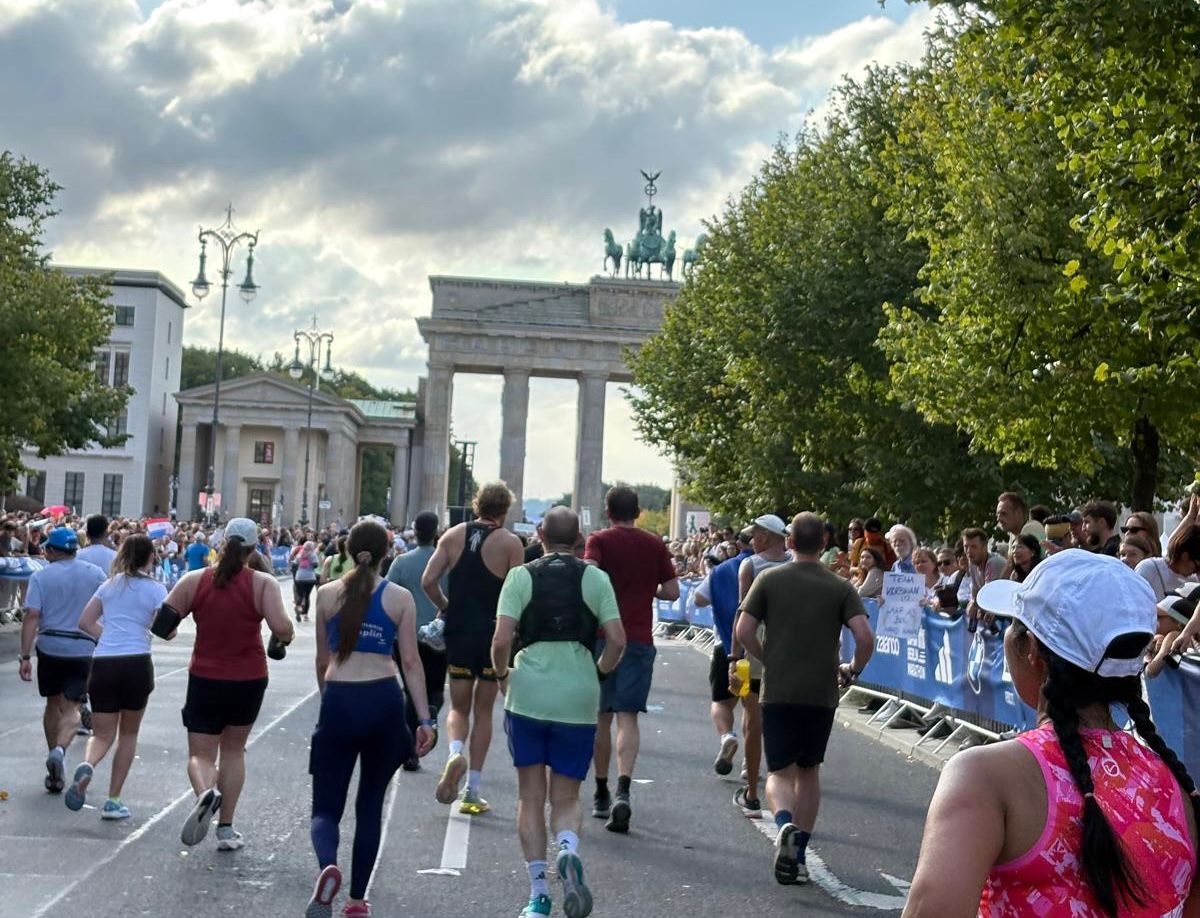Innovation Bridges Nations + AI and Global Trade + China’s Auto Surge + Limits of the Engineering State + Oktoberfest 1900 + France’s Eurozone Strains + Germany’s New Budget Era
Which country is set to host the 2025 UN Climate Change Conference (COP30) under the UN Framework Convention on Climate Change (UNFCCC)?
Brazil
 Dear Readers,
Dear Readers,
Welcome to the Diplomacy Berlin Newsletter.
Our focus this week spans innovation, trade, and shifting global dynamics. We are pleased to feature an exclusive conversation with Jan Lachenmayer, Chair of the German Indian Innovation Corridor (GIIC), exploring how this initiative is reshaping Germany – India ties, strengthening transnational cooperation, and leveraging Berlin’s unique ecosystem at the crossroads of diplomacy and entrepreneurship.
Alongside this, we look at how artificial intelligence is set to reshape the future of global trade, with the potential to drive growth while deepening divides if policies fail to keep pace. At the same time, China’s rise in the automotive sector is redefining industrial competition in Europe, raising questions about how traditional players can adapt. We also reflect on the limits of state-driven engineering models, consider Germany’s new budget and what it signals for fiscal priorities, and examine growing concerns over France’s economic position on Europe’s periphery.
On the cultural front, we spotlight Netflix’s Oktoberfest 1900, a historical drama that connects tradition with the present moment, just as Munich prepares for this year’s celebrations.
We extend our heartfelt congratulations to Mali (September 22) and Saudi Arabia (September 23) on their national days, celebrating their heritage, resilience, and contributions to the global community.
As always, thank you for joining us and if you would like to contribute content for upcoming newsletters or press releases, please contact us at editorial@diplomacy.berlin.
With best regards,
Sigrid Arteaga
Bridging Nations Through Innovation: Jan Lachenmayer on the German Indian Innovation Corridor
Jan Lachenmayer is a seasoned entrepreneur and innovation leader with nearly 20 years of experience building and managing teams across continents, industries, and high-paced environments. As Chair of the Executive Board of the German Indian Innovation Corridor (GIIC e.V.), he champions Indo-European collaboration in technology and sustainable growth. He is also Co-Founder & COO of FORMATION GmbH, a data-powered startup driving digital workforce transformation, and a Partner at the Berlin Governance Platform. With a career spanning corporate consulting, EU-funded research projects, political advisory, cultural events, and tech startups, Jan combines a passion for people, technology, and big-picture thinking with a deep commitment to co-creation, diversity, and humanistic ideals.

The German Indian Innovation Corridor brings together stakeholders from both countries to foster innovation, collaboration, and sustainable growth. As its Chair, how do you see this initiative reshaping not only Germany India ties but also the broader transnational innovation landscape?
Our mission at GIIC is clear and bold: India + Germany for the world—a ten-year alliance designed to advance innovation, shared prosperity, and geopolitical stability. We see a rare, time-bound window of opportunity to build an Indo-European partnership that can set new global standards for sustainable, open innovation. In a world marked by technological rivalry and geopolitical turbulence, this is the moment to act.
India brings extraordinary digital dynamism and youthful talent; Germany contributes world-leading deep-tech research and advanced manufacturing. Together they can form an Indo-European lighthouse of collaboration, radiating solutions in energy, mobility, health, and AI far beyond their borders.
Yet we are keenly aware that such a transformation is neither automatic nor easy. By bringing 300 top decision-makers to Berlin this October, we aim to spark lasting commitments and to mobilize a global coalition of allies. Our ambition is grand, but our call is humble: only through shared effort can we seize this fleeting chance to reshape the transnational innovation landscape.
You’ve worked at the intersection of technology, governance, and entrepreneurship. In your view, what role can innovation corridors like GIIC play in strengthening global cooperation at a time when geopolitical and economic tensions often hinder collaboration?
Innovation corridors such as GIIC are bridges of trust in an age of fractures. When geopolitical tensions and economic rivalries make cooperation harder, these corridors create neutral, action-oriented spaces where shared opportunities outweigh zero-sum competition.
They rest on values of openness, mutual respect, and shared responsibility. By bringing together people with different histories and perspectives, they foster collaboration that is inclusive and forward-looking. Technology and innovation are seen not as ends in themselves, but as tools to create opportunities, solve global problems, and strengthen peaceful coexistence. Such platforms encourage co-creation and a long-term perspective, showing that collective progress is possible even when politics is polarized.
The stakes are high and the moment is short. If we mobilize now, innovation corridors can anchor a new era of multilateral collaboration, proving that openness and shared prosperity remain possible even in turbulent times.
Berlin is a hub for diplomacy, startups, and cross-sector partnerships. From your perspective, how can the city’s international and diverse ecosystem be leveraged to better connect innovation with diplomacy and governance?
Berlin thrives on a free-spirited mindset that attracts people from every continent who are motivated by purpose and creativity more than by quick profit. Artists, technologists, social entrepreneurs, and policy thinkers come here to experiment and to build ideas that carry meaning. This is fundamentally different from the financial drive of London or New York, the administrative precision of Paris, or the hyper-efficiency of Tokyo.
Yet Berlin has not fully claimed the global role its spirit makes possible. In a rapidly changing world order, the city could stand as a beacon for open, value-driven cooperation—a place where diplomacy and innovation are guided by shared ideals of fairness, sustainability, and mutual respect. If Berlin embraces this potential, it can become a unique arena where global challenges are met through creativity and dialogue rather than competition alone.
By channeling this creative energy into structured dialogues like the German-Indian Innovation Summit, Berlin can turn experimentation into lasting cross-border frameworks, linking technology with global cooperation and shared responsibility.
AI Set to Transform Global Trade: WTO World Trade Report 2025
The World Trade Organization’s 2025 World Trade Report finds that artificial intelligence (AI) could propel the value of global trade in goods and services by nearly 40% by 2040, provided policies are put in place to bridge the digital divide and support workforce skills. The report highlights that AI-driven cost reductions and productivity gains have the potential to add up to 37% to global trade volumes and boost global GDP by 12-13% under various scenarios.
However, realizing these gains requires proactive investments in digital infrastructure, education, and open trade regulations, especially for low- and middle-income economies. Without such measures, gaps in access and restrictive trade policies could worsen inequality and leave many countries behind amid the AI revolution.
To know more about the report’s findings and recommendations, read more on the World Trade Organization’s official site.
IAA 2025: China’s Automotive Surge Redefines Global Competition
The 2025 International Motor Show (IAA) in Munich spotlighted China’s ambitions and rising dominance in the global automotive sector, with the largest ever cohort of Chinese exhibitors directly challenging Europe’s legacy carmakers. Brands like BYD, Changan, and Nio unveiled cutting-edge EVs, smart connectivity features, and next-generation battery tech showing how far China has moved from “budget” vehicles to credible challengers in both mass and luxury markets.
What stood out was not just scale, but “China Speed”: vehicles designed, engineered, and brought to market in record time, creating pressure on European brands to keep pace. At the same time, German premium car sales in China continue to slide, while Chinese market share in Europe is doubling year on year. The IAA was more than an auto showcase it was a geopolitical arena, underscoring how China is rewriting the rules of electrification, leveraging supply chain dominance and cost efficiency as strategic tools. For Europe, the message is clear: innovate faster, build resilient supply chains, and help shape global standards or risk being left behind.
Read more about it on Diplomacy Berlin’s website.
China and the Limits of Its ‘Engineering State’
The Economics Show podcast episode features Dan Wang, author of „Breakneck: China’s Quest to Engineer the Future,“ discussing the unique strengths and vulnerabilities of China’s technocratic rise. Wang characterizes China as an „engineering state, a nation where rapid construction and innovation in infrastructure, manufacturing, and technology have propelled its ascent to superpower status.
Yet, breakneck growth has led to challenges like overproduction and deflation, with Beijing now striving to boost domestic demand and avoid instability. Wang details how China’s focus on building comes with social costs, from rigid policies like the one-child and zero-Covid initiatives, to a tendency for leaders to view citizens as aggregates for management rather than individuals. The episode underscores the dilemmas China faces in balancing relentless development with sustainable economic prosperity and human well-being. To know more about these insights, listen on Apple Podcasts.
Oktoberfest 1900: Netflix Historical Drama
Step back in time to Munich at the turn of the 20th century with Oktoberfest 1900, a gripping German drama series. Follow the ambitious brewer Mišel Matičević, Martina Gedeck, and Klaus Steinbachercity, all against the lively backdrop of Munich’s famous Oktoberfest.
Across six thrilling episodes, the show mixes history, rivalry, and suspense, bringing early industrial Bavaria to life. With standout performances the series has been praised for its authentic period details and intense, emotional storytelling.
Don’t miss this dive into ambition, tradition, and power in one of Germany’s most iconic folk festivals! Watch the series on Netflix.
France joins Eurozone’s ‘periphery’ as turmoil deepens, say investors
France’s borrowing costs have surged, with 10-year bond yields now above Greece and close to Italy, as political instability intensifies. Prime Minister François Bayrou resigned after failing to pass his deficit-cutting budget, leaving President Macron to find a successor capable of navigating a hung parliament. Investors are warning that France is slowly shifting into the Eurozone’s “periphery,” a category of riskier borrowers once reserved for countries like Greece and Italy.
With France’s debt-to-GDP ratio expected to reach 118% by 2026 and social unrest looming, market volatility is likely to continue. Bond managers expect a prolonged period of uncertainty, and any fiscal consolidation is unlikely until after the 2027 presidential elections. Read more on Financial Times.
Germany approves 2025 budget, ushering in new era of spending
Germany’s parliament has passed the 2025 budget, allowing €116 billion in investments supported by a €500 billion infrastructure fund and special exemptions for defence spending. Finance Minister Lars Klingbeil called it a “huge paradigm shift,” aimed at boosting the economy and strengthening military support commitments to NATO and Ukraine. Defence spending will rise to 2.4% of GDP, though still below NATO’s new 3.5% target.
The total budget reaches €591 billion, combining core spending and special funds, with total borrowing projected at €143.2 billion. Chancellor Friedrich Merz’s coalition now faces challenging discussions for future budgets, including a €30 billion gap projected for 2027. Parliament will debate the 2026 draft next week. Read more on Reuters.
The Brookings Foreign Policy program is a leading center for rigorous, policy-relevant research dedicated to tackling major challenges to international peace and security. It produces in-depth, nonpartisan analysis to inform policymakers and public debates, offering actionable solutions to some of the world’s toughest problems. With a legacy of shaping key policy decisions ranging from the founding of the United Nations to modern geopolitical strategies, the program serves as a trusted resource for government officials, civil society, and the private sector. Read about the program on Brookings Foreign Policy’s website.
1st Annual Interdisciplinary WZB Conference: The Future of Democracy?
The Berlin Social Science Center (WZB) will host its first annual interdisciplinary conference titled „The Future of Democracy?“ on October 9-10, 2025. The event aims to address pressing challenges to liberal democracy by bringing together experts from fields such as economics, political science, sociology, psychology, and law. The conference will feature keynote speeches from leading academics and panels that include high-level representatives from politics and civil society. Topics will cover issues like polarization, misinformation, party systems, civic engagement, and the role of courts in protecting democracy. Read more about it at the official WZB conference page.
Quantumtechnologien & Startups: From research to application- Berlin
On October 16, 2025, the Business Club Luxemburg-Deutschland and the Luxembourg Embassy in Berlin, together with CorpPearls and LuxProvide, will host the event “Quantumtechnologien & Startups: Von der Forschung zur Anwendung.” Held at the Luxembourg Embassy in Berlin, this event coincides with the UN’s International Year of Quantum Science and Technologies, and spotlights quantum technologies’ transformative potential across industries such as cybersecurity, logistics, and advanced materials. Participants can expect keynote talks, startup presentations, panel discussions with leaders from politics, business, and research, and live pitches from emerging companies in quantum innovation. The evening will conclude with networking and a reception. Register to attend via the official BCLDE event page.
SIBB Summer Reception 2025 at Berlin’s Wannsee: Networking with a Vision for the Digital Future
On September 12, SIBB – Digital Association Berlin-Brandenburg – hosted its annual summer reception by the shores of Berlin’s Wannsee. Around 200 guests from the region’s digital economy gathered at the Berliner Sparkasse venue to enjoy late summer vibes, live jazz music, fine catering, and an evening full of exchange and inspiration.
At the heart of the discussions were topics shaping the future of the metropolitan region: data sovereignty, open standards, and the digital transformation of public administration. In addition, cross-cutting issues of global importance – such as cybersecurity, digital sovereignty, AI ethics, and GovTech innovation – sparked lively conversations, underlining how the Berlin-Brandenburg ecosystem connects to international debates. Entrepreneurs, startups, and representatives from politics and government explored how digital solutions can strengthen resilience and future-readiness. True to SIBB’s motto, the event demonstrated that “Connecting Digital Minds” is a lived reality.

Berlin Marathon: Where the World Runs Together

Attending the Berlin Marathon is a truly electrifying experience. This year, nearly 80,000 participants from 160 nationalities took part in the iconic race, transforming the city into a colorful, bustling celebration of global unity and athletic spirit. What stands out is the incredible warmth and encouragement runners receive not only from their own compatriots living in Germany but also from Berliners and Germans from all walks of life, who line the streets cheering every step of the way. The city becomes a vibrant mosaic of languages, flags, and motivated supporters, creating an atmosphere where every participant feels welcomed, energized, and part of a shared journey. Watching thousands from around the world push themselves on Berlin’s fast course is a reminder that sport bridges cultures and boundaries in the most inspiring ways.
Dine Above The City: Käfer Dachgarten Restaurant at the Reichstag. Nestled atop the historic Reichstag building in the heart of Berlin, the Käfer Dachgarten Restaurant offers a truly unique dining experience with panoramic views of the city skyline. As the only public restaurant within a parliamentary building worldwide, it combines modern German cuisine crafted from fresh, regional, seasonal ingredients with exceptional service. Led by Head Chef Christoph Büchner, the menu changes seasonally and features creative, down-to-earth dishes prepared in an open kitchen that showcases culinary artistry. With automatic access to the glass dome and rooftop terrace included with every reservation, Käfer Dachgarten Restaurant is an unmissable culinary destination for both locals and visitors seeking an exclusive taste of Berlin’s vibrant culture. To make a reservation visit their website.
Sleek, Powerful, and Portable: Discover espresso’s Award-Winning Displays: Espresso Displays offers some of the world’s thinnest and most advanced portable touchscreen monitors, designed to expand and enhance your workspace wherever you go. Known for their sleek aluminum and glass design, these monitors combine ultra-portability with high performance, including 4K resolution, touch and pen input capabilities, and seamless compatibility with Mac and Windows devices. To explore their products and elevate your mobile workspace, browse the latest models and accessories at Espresso Displays.
